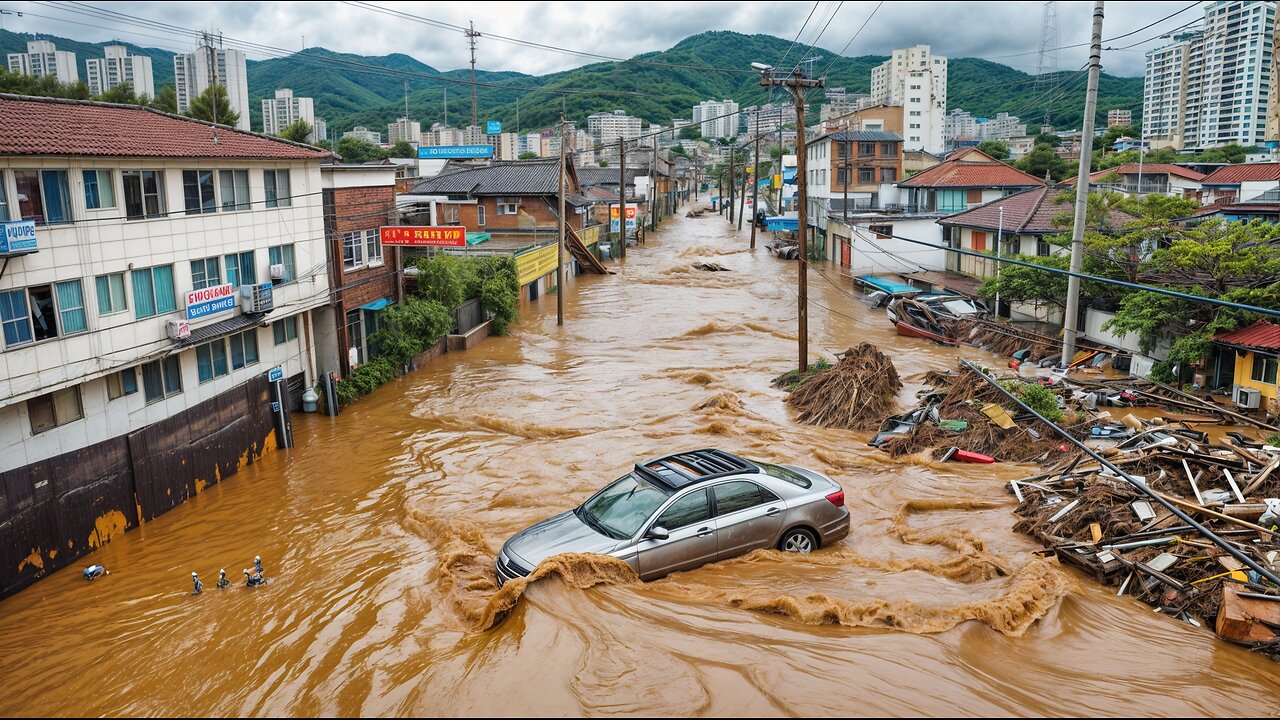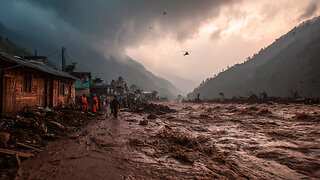Premium Only Content

South Korea NOW! Record-Breaking Rain Impact: Floods and Landslides Claimed Lives
On July 8, dangerous downpours hit South Korea, causing floods, landslides, and resulting in casualties and destruction. The provinces of South Chungcheong and North Jeolla were severely affected.
The Korea Meteorological Administration reported that some areas of the country experienced record rainfall, which may occur once every 200 years.
In the city of Gunsan, located 178 kilometers south of Seoul, 5.18 inches of rain fell in one hour on Wednesday morning, which is more than 10 percent of the area's annual average rainfall. This was the highest amount of hourly rainfall officially recorded across the country.
Some areas of the central region received more than 7.8 inches of rain in one day.
South Korean television channels showed footage of rivers overflowing and flooding roads due to heavy rain. In some areas, people were seen wading through waist-deep water. Unfortunately, floods and landslides resulted in casualties.
As of July 11, preliminary reports indicated that 7 people had died due to the three days of heavy rain. Searches for missing people were ongoing, and more than 3,500 people had been displaced.
Interior Minister Lee Sang-min urged people to refrain from visiting underground parking lots, underpasses, and to stay away from rivers during heavy rain.
The torrential rain led to the cancellation of 21 flights at Gimhae International Airport in Busan and delays of another 16 flights. All rail services on the Janghang line in South Chungcheong and the Gyeongbuk line in North Gyeongsang were suspended.
Landslide warnings were in effect in more than 50 areas. Property, roads, and infrastructure were severely damaged. More than 270 homes and buildings, 577 public facilities, 129 roads, and 100 embankments were flooded.
The national railway service Korail suspended train operations on six central regional routes. Other high-speed trains continued to operate, but speeds were reduced in some areas.
July is traditionally the monsoon season in South Korea, but in recent years, the country has experienced truly extreme weather conditions during this time. This trend is observed worldwide and is caused by record increases in the temperature of the atmosphere and ocean, as well as higher atmospheric moisture content. If these parameters are normalized, rainfall would become less intense and more evenly distributed across the planet. There would be no areas with abnormal droughts or regions where an annual rainfall amount falls in one hour.
The technology to achieve this already exists. Moreover, it would not only minimize the strength of disasters but also clean ocean water and air from microplastics. To learn more about this technology and how to implement it widely, watch the documentary film "Water From Air: The Path to Saving Humanity | Popular Science Film."
-
 5:22
5:22
AllatRa TV
1 day agoIndia Floods: Uttarakhand Hit by Deadly Rains and Landslides
8 -
 LIVE
LIVE
DoldrumDan
1 hour agoCHALLENGE RUNNER BOUT DONE WITH ELDEN RING NIGHTREIGN STORY MODE HUGE GAMING
63 watching -
 10:59
10:59
itsSeanDaniel
1 day agoEuropean Leaders INSTANTLY REGRET Disrespecting Trump
19.6K14 -
 16:43
16:43
GritsGG
16 hours agoThey Buffed This AR & It Slaps! Warzone Loadout!
18.1K1 -
 2:05:30
2:05:30
Side Scrollers Podcast
20 hours agoEveryone Hates MrBeast + FBI Spends $140k on Pokemon + All Todays News | Side Scrollers Live
106K11 -
 11:06
11:06
The Pascal Show
14 hours ago $1.32 earned'THEY'RE GETTING DEATH THREATS!' Jake Haro's Lawyer Breaks Silence On Emmanuel Haro's Disappearance!
14K2 -
 LIVE
LIVE
Lofi Girl
2 years agoSynthwave Radio 🌌 - beats to chill/game to
310 watching -
 2:19:32
2:19:32
Badlands Media
1 day agoDEFCON ZERO Ep. 005: False Flags, Cyber Fronts & Global Power Plays
159K66 -
 2:35:23
2:35:23
FreshandFit
9 hours agoWhy Black Men Don't Date Black Women Debate
43.5K41 -
 2:03:42
2:03:42
Inverted World Live
13 hours agoBigfoot Corpse Coming to the NY State Fair | Ep. 94
113K27